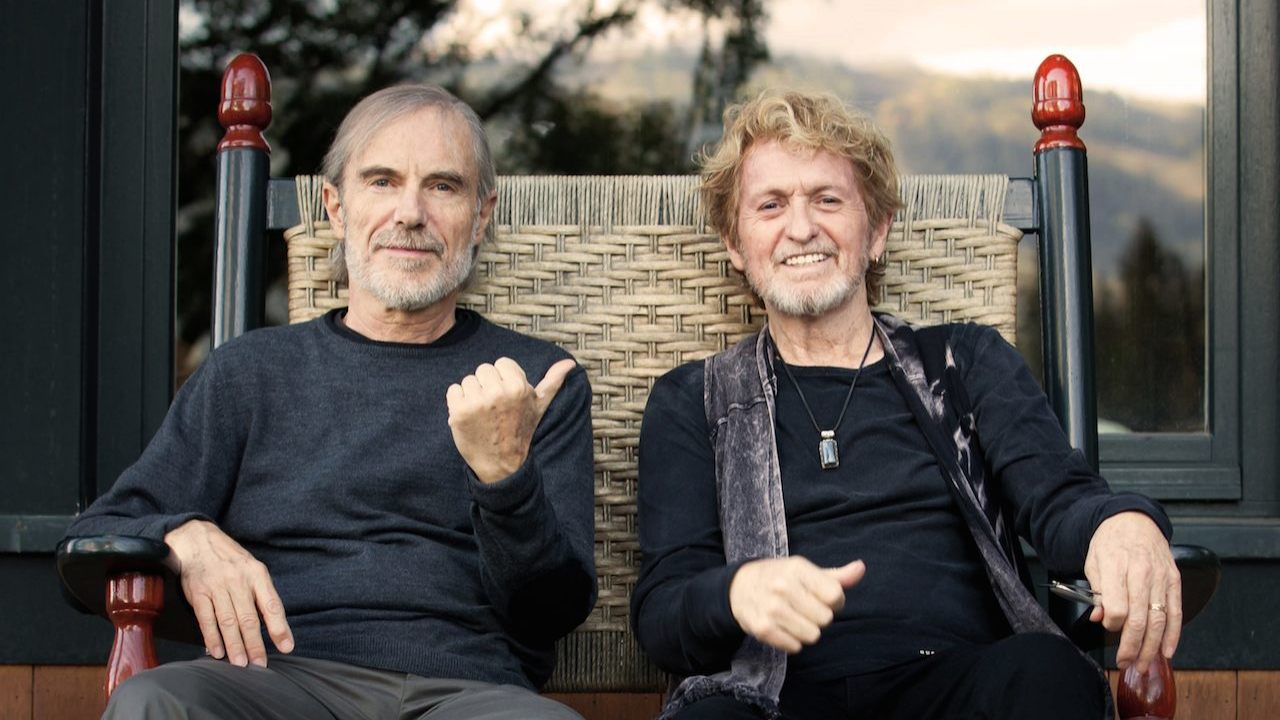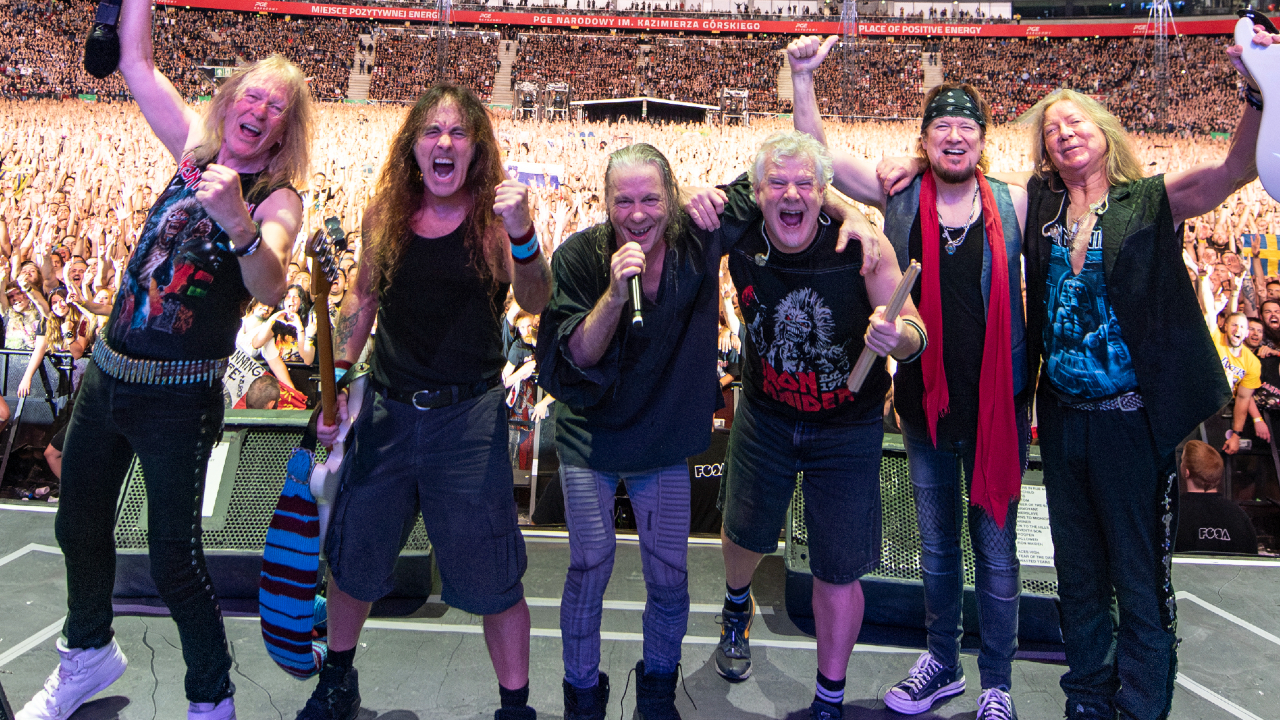TR+ Extended Interview – Welcome Back: Jon Anderson
The former Yes vocalist and the electric violin virtuoso join forces – at last – as the AndersonPonty band.

Select the newsletters you’d like to receive. Then, add your email to sign up.
You are now subscribed
Your newsletter sign-up was successful
Want to add more newsletters?

Every Friday
Louder
Louder’s weekly newsletter is jam-packed with the team’s personal highlights from the last seven days, including features, breaking news, reviews and tons of juicy exclusives from the world of alternative music.

Every Friday
Classic Rock
The Classic Rock newsletter is an essential read for the discerning rock fan. Every week we bring you the news, reviews and the very best features and interviews from our extensive archive. Written by rock fans for rock fans.

Every Friday
Metal Hammer
For the last four decades Metal Hammer has been the world’s greatest metal magazine. Created by metalheads for metalheads, ‘Hammer takes you behind the scenes, closer to the action, and nearer to the bands that you love the most.

Every Friday
Prog
The Prog newsletter brings you the very best of Prog Magazine and our website, every Friday. We'll deliver you the very latest news from the Prog universe, informative features and archive material from Prog’s impressive vault.
His helium-high voice was one of the unmistakeable trademarks of legendary prog band Yes; Michael Jackson was a big fan of his music with Vangelis, and he was once laughed out of town for mooting what, years later, we’d know as Kickstarter.
Jon Anderson has now joined forces with electric violin maestro (and former Frank Zappa collaborator) Jean-Luc Ponty in The AndersonPonty Band, his first proper group project for years. They’re embarking on a tour in support of debut album Better Late Than Never, a spirited, nearly-live set of brand new material and buffed-up versions of some old classics.
Didn’t Jean-Luc Ponty first approach you to do something back in the eighties?
Yeah. We kept bumping into each other. He’d worked with Mahavishnu Orchestra, who are one of my favourite bands of all time, and we talked about it back then. It was really good to meet somebody where we sort of knew each other from another time. But it took a long time for us to organise ourselves and get together.
Hence the album title. So how did the collaboration eventually materialise?
I was working with a musician friend in Oregon a few years ago, and Jean-Luc had played on the track we were doing. I thought, Oh my gosh he’s still amazing, better than I remember, and that’s when I thought we have to make this happen. I downloaded a couple of his tracks from the seveties and eighties, sang some ideas over them, sent the MP3s to him, and he loved it.
*Better Late Than Never* was recorded last year at Wheeler Opera House in Aspen Colorado. You’ve describe it as ‘a live performance enhanced by some innovative production’…
Sign up below to get the latest from Classic Rock, plus exclusive special offers, direct to your inbox!
Basically we did two live shows after two weeks of rehearsal. The first night wasn’t so good, then the second night was very good, but then looking at it under a microscope you spot things – I sang some words wrong, the violin parts weren’t all perfect, the guitars weren’t that good – so we had to replace a few things. But most of the music was really happening – the drums, bass and keyboards were nearly perfect. This band are the cream of the cream, they really can play anything.
Pro Tools is a wonderful thing. You must wish you’d had cut-and-paste back in the day?
Back then we were busy with sellotape and razor blades. Especially with something like Close To The Edge, which I think had fourteen parts – a minute here, thirty seconds there. Our engineer, Eddy Offord, was amazing. The classic story was when we were just finishing the editing of Close To The Edge Eddie would have these six-foot-long tapes of quarter-inch tape sellotaped to the wall, all catalogued so he knew what needed to go where to make each section of the song. Over a period of two days he’d be sticking it all back together again. Then at night the little lady from next door, Lizzy, would come in and clean up…
And she…
We came in to do the last chorus of Close To The Edge, Eddie looks up and says: “Wait a minute, the tape’s missing!” I said that Lizzy had just cleaned up, maybe it fell on the floor and she put it in the bin? So Me, Eddie and Steve [Howe] went outside to the bins in a total panic. It was raining, and Eddie found the first half of the last chorus of Close To The Edge there in the bin. He wiped it off and took it back inside.
**You’ve really taken to the internet. Your album Survival featured your collaborations with musicians from all over the world. **
I’ve been working this way for over twelve years now, I have so many projects at any one time. It’s this idea of working with musicians, illustrators, animators, these ideas are only there because of the internet. The new song One In The Rhythm Of Hope is based on an early Jean-Luc track [Rhythm Of Hope], and the lyrics really struck me – ‘after the fall of the government, after the fall of the innocents’ – after the fall of all these understandings that surround us, we are collectively one, one on this planet. We’re connected in so many ways, and one of those ways is the internet. It shows us what’s going on around the world. It’s going to bond us together more, I think.
You funded Better Late Than Never through Kickstarter. So you’re a convert?
I remember talking to the guys in Yes in 2002 about that same idea. Record companies weren’t very excited about Yes back then, so I said: “Look, we don’t need record companies. What we need is to go to the bank, or even get fans to send in twenty bucks each and they’ll get an album, a T-shirt, whateve, or if they pay more they get concert tickets. And they just looked at me and said: “John, you’re living in la-la land!” And here we are, Kickstarter is financing films, theatre, rock’n’roll. It’s people investing their money in what they believe in, and it works very well.
On this record you reinterpret some classic songs quite radically – a jazzy piano take on Wonderous Stories, reggae takes on Owner Of A Lonely Heart and Time And A Word…
Well we’re not going to try and be Yes and do, say And You And I, but people come to your shows and they want to hear Roundabout, they want to hear Owner. I’d rather try another sound, something different. That’s just what I’m like, I’m adventurous, and I hope the audience love just to hear the song and the new arrangement comes as a surprise.
There seems to be constant wellspring of goodwill towards yourself and Yes. Why do you think that is?
There was a lot of honesty put into the music, and we didn’t think about radio. Heart Of The Sunrise, Gates Of Delirium, Starship Trooper – these were adventurous pieces of music that didn’t have a lot to do with business. At times management would get a couple of the guys from the band and say to them, ‘Come on, get Jon to do a couple of songs more like Fragile!’ And the more they did that the more I tried to push harder the other way. The life of the band was thirty-five years. Which is pretty unheard of unless you’re going out there and playing ten or so hit records, like most of them do. But Yes only had two hit records, so it was all about the music and what the audience got from going to see Yes. The last time I toured with them we had Rick in the band, Roger Dean did the staging, we were doing long-form pieces and you could hear a pin drop. Where else do you get that?
You must have thought a lot about Chris Squire since he passed away in June?
Of course. He was a wild and crazy guy. And one of the great bass players of all time, and an incredible singer. As I said to him before he passed away, without him I wouldn’t be doing what I’m doing now, and I thanked him for that. We both agreed what a journey we took together for thirty-five years. It’s like any family; you have your ups and your downs. But the main thing was when we went on stage we did great performances. And I remember Chris was always there. No matter what went on he was always there playing great bass, singing so well, and connecting, you know? He was a great showman. God bless him. The other side of that coin was business, silly crazy business.
Was he better at the business side than you?
Do you know, I don’t know. A business is a very controlling instrument. It tries to control the band, to make as much money as it can in a short period of time. It has very little interest in the humanity and brotherhood of a band, and it always tries to poke its way in. I was very thankful to work with Vangelis, because that was the opposite of Yes; very free-form, hardly any business talked about. We just created music.
But then you two went and had loads of hits!
[Laughs] Because we weren’t thinking about it! But it rang a bell with the record company because they exploited it and went out and made it work. Over the years I’ve been lucky to work with many musicians – Kitaro, Michael Oldfield and now Jean-Luc. The Vangelis work opened a world to me and I’m doing it more than ever now. But without Chris I’d never have got out of Wardour Street.
Is it the residuals from those songs that keep the heating on?
It keeps things going. When Quincy Jones recorded State Of Independence with Donna Summer they brought in Michael Jackson, Stevie Wonder, Diana Ross – a dozen great singers are on that record. Quincy’s told me many times that he and Michael listened to that album when they we’re making Thriller. [Sings Jacko’s Billie Jean] now compare it to Friends Of Mr Cairo [which he sings; it sounds much whiter]. Quincy said, It’s the same groove man, we just funked it up! That album touched a lot of people across the world.
A few years back when you played Under The Bridge [the venue under Chelsea football ground] you opened with a chorus of Glory Glory Man United! Do you fancy their chances this season?
Yeah, they’re starting to gel really well. This new guy who plays number nine [Anthony Martial] he’s great, you’ve got Mata, Rooney’s playing better now, we’ve got the best goalkeeper in the world [De Gea]. Actually I watch Barcelona now, so I’m betwixt the two.
The AndersonPonty Band album’s out now, so what’s next?
We do our first show on the twenty-seventh of October. We’ve only done two, so now we’re going on the expedition to become a better band. We’ll be in the UK in the spring, and by then we’ll be kicking on all cylinders.
A music journalist for over 20 years, Grant writes regularly for titles including Prog, Classic Rock and Total Guitar, and his CV also includes stints as a radio producer/presenter and podcast host. His first book, 'Big Big Train - Between The Lines', is out now through Kingmaker Publishing.

